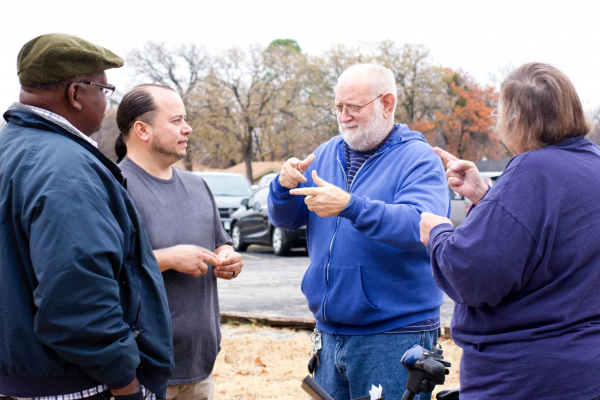
Humility: The Foundation Global Workers Need
By Sue Eenigenburg
I didn’t see myself as proud. With training and willingness to serve, and feeling led by God, I was ready to do my part for the Great Commission. I discovered, though, that my heart wasn’t as humble as I thought it was. I caught myself feeling angry at how different my new culture was for me when I was working so hard to fit in. Pride was more of an issue than I realized. But God graciously helped me realize that cultivating humility is essential in cross-cultural ministry.
Many people preparing to serve overseas think they are already humble and feel ready to serve in a new country. Pride, however, can rear its ugly head in even the humblest of hearts. We are vulnerable when engaged in spiritual battles while struggling with culture stress. In recognition of that, global workers must be willing to learn humility—a quality that can grow with intentionality, practice and patience.
I recall a missions conference I attended during which the moderator asked a panel of experienced global workers a question: “What traits do mission agencies look for in potential workers?” They all agreed with a number one answer: humility. That makes sense. A humble attitude is essential when learning a new language and culture. Humility holds a team together as members get to know each other and serve side by side in the community.
The key to lasting in ministry is the willingness to admit we need to keep growing, even in the areas we view as our strengths. Humility is foundational for this willingness to grow in every aspect of our lives.
Willing to Grow in Faith
We wouldn’t be eager to serve overseas if we didn’t trust that God is guiding us there. We trust Him for our salvation in Jesus Christ, looking to the Word of God for direction. As people who sense God leading us into cross-cultural ministry, we must also acknowledge the need to grow in our faith and desire to do so.
Raising support. Moving into the unknown. Leaving family. Starting over. These all require stepping out in faith. But depending on the faith needed to leave will only get us so far. We face even bigger obstacles once we arrive on the field, and becoming complacent isn’t an option. We won’t be fruitful and won’t be able to persevere in ministry if we aren’t growing in our faith. And we won’t grow if we become proud and cling to faulty perceptions that we have arrived in our spiritual walk. Humility enables us to grow in faith.
Willingness to Develop Healthy Relationship Skills
Each of us develops ways to relate to others within our family circles. Sometimes we experience healthy ways to solve disagreements, but at other times we acquire poor strategies for handling conflict. We take those tactics with us wherever we go and use them in our own families and on our teams. But even when we’re equipped with healthy ways to manage conflict, in the throes of culture stress, we won’t be on our best behavior.
No matter how solid our relationships are, they will face challenges. Learning about conflict management styles and proactively preparing for conflict before it occurs is crucial as this can help to take the “attitude” out of it.
It’s also vital that we are willing to work through conflict rather than avoid it. Often, when believers in the U.S. experience conflict in their church, they can switch churches. It is easier to do that than go through the challenging work necessary to forgive and reconcile. But without that competency, we sometimes lack the ability to work through conflict on the field. Then, due to pride, we blame others, and teams can implode or explode. Being humble while working through conflict is essential.
Willingness to Venture Out of Comfort Zones
When does comfort become an idol? Comfort isn’t wrong. Sometimes being comfortable is an effective way to care for ourselves. But staying in comfort zones is inconsistent with going into cross-cultural ministry.
Venturing to a new country takes us far away from our comfort zones. At first it is exciting, but then the reality sets in that we are totally foreign. Making cultural blunders and language mistakes is uncomfortable. I remember feeling embarrassed that I couldn’t talk like an adult or even read a children’s book in my new language. I was tempted to stay home rather than face the onslaught of more discomfort out in the community. I dealt with loneliness and isolation, overwhelmed with all that was different. But my husband and I didn’t say yes to cross-cultural ministry so that we could remain safe and secure. We eventually felt more at home, and our comfort zones broadened. We needed humility to keep going and to keep learning from every mistake we made.
Willingness to Be Flexible
Diverse cultures have different values. Some think time is important. Others think relationships matter more than being on time. There are differences in how people view authority and how willing they are to take risks. In some cultures, people work more in community, and in others they are more individualistic.
When we consider our own culture superior, we cling rigidly to our own values. As a result, we have a much harder time relating to those we want to love and serve.
Living cross-culturally requires us to note the differences and adapt to the new culture. This flexibility is impossible without humility.
Willingness to Persevere
Endurance seems unnatural to me. I tend to want to escape what is difficult rather than go through it. Thankfully, perseverance can be developed, and the best way to learn endurance is to endure.
To persevere, we must be willing to go through the hard stuff. This requires humility: the recognition that we can’t do this on our own.
During trials, we feel woefully inadequate and overcome by the challenges. My ministry looked so different from what I thought it would be like from the safety and comfort of my home country! Every global worker discovers that we desperately need God. This is the foundation of humility, and as we learn from James 4:6, “But he gives more grace. God opposes the proud but gives grace to the humble.” (NIV)
In our humility, we find that God’s grace empowers us to keep going when all else fails.
Willingness to Leave
Deciding whether to go or stay in our current country of service can be tumultuous, and it may take a humbler attitude to decide to leave. When God nudges us to a different country or ministry role, we hesitate. Humility is needed to even broach the possibility of leaving.
I recognized pride in my own heart when I was concerned about what people would think about us and our decision to leave. What if they think we are quitters? Why aren’t we staying? If it’s hard it will surely get better; if it’s fruitful, why leave? Will they think I’m moving with wrong motives? How will my supporting churches view such a move? Will I lose support?
We often don’t know what is best. And here, too, humility is key. We humbly look to God to guide our steps into the unknown.
Humble Willingness
To be willing to grow in each of these essential areas requires humility. By His grace, may each of us humbly find and fulfill our roles in the Great Commission.










































